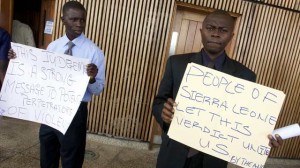
People hold signs outside the Special Court for Sierra Leone, where people gathered to watch a live broadcast of the verdict in the Netherlands-based trial of former Liberian president Charles Taylor, in Freetown, Sierra Leone Thursday, April 26, 2012. (AP Photo/Felicity Thompson)
“The conflict in Sierra Leone became notorious because of its gruesome tactics, including the calculated mutilation of thousands of civilians, the widespread use of drugged child soldiers and the mining of diamonds to pay for guns and ammunition. A new, sinister rebel vocabulary pointed to the horrors: applying “a smile” meant cutting off the upper and lower lips of a victim, giving “long sleeves” meant hacking off the hands and giving “short sleeves” meant cutting the arm above the elbow. …
Mr. Taylor, who has maintained his innocence, will be sentenced in the coming weeks. There is no death penalty in international criminal law and any jail term would be served in a British prison.”
Although the civil wars that took place in Sierra Leone and Liberia were intertwined, the special court set up by the United Nations and the government of Sierra Leone was only authorized to address crimes committed in Sierra Leone. Human rights groups told the BBC that the decision is “historic” and “incredibly significant.” Amnesty International issued a statement saying, in part, “while today’s conviction brings some measure of justice to the people of Sierra Leone, Taylor and the others sentenced by the Special Court are just the tip of the iceberg.”
Earlier this week, Liberian peace activist and Nobel Peace Prize winner Leymah Gbowee talked with Daily Beast editor Tina Brown about what a guilty verdict would mean to her. She stressed that Liberians should focus on rehabilitating the child soldiers who are now adults: “We need to ask them what contributions they see themselves making to Liberia, and to find a constructive way to include them in our national dialogue. …Bringing these young ex-combatants home spiritually and physically matters to all of us. We need their help rebuilding our country.”
In 2009, Lynn Scherr conducted an interview with Leymah Gbowee and Pray the Devil Back to Hell producer Abigail Disney on Bill Moyers Journal. They talked about the atrocities of the 15-year Liberian civil war between the government of the corrupt and ruthless Charles Taylor and the warlords trying to oust him.
Gbowee described how she led her fellow countrywomen to fight for and ultimately win peace. In 2003, Taylor was toppled from power and banished from Liberia. The country then elected a new president, the first woman head of state in Africa, Ellen Johnson Sirleaf. Gbowee called the all-encompassing horror of the Liberian civil war “hell” on earth.
“There is no other description because when you read about hell, there is nothing explicit about the word ‘hell’ that says joy. And that was the life we lived, no joy. You wake up in the morning and you’re just wondering what is going to be different today? Am I going to be shot as I walk the streets? Or is my younger brother going to be conscripted? Or am I going to be raped? You know, every day you wake up and there was one terrible thing after the other. Seeing people being taken off the line and being killed, and early morning someone comes to you and says, ‘Remember your classmate you graduated with three months ago? This morning the entire family was slaughtered.’ Those were the kind of things we grew up with. There is no description, there is no way that you can call this life. Death, at one point, was better than life.”
Watch the entire interview at the archived Bill Moyers Journal website.

